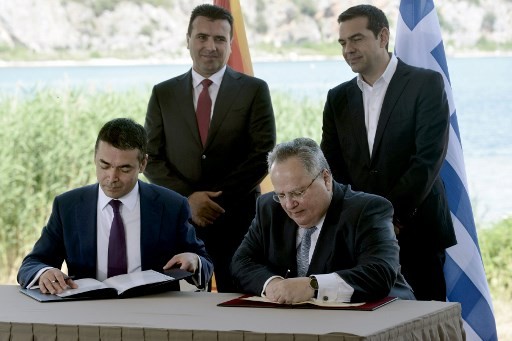ATHENS – Greece and Macedonia have signed on Sunday a historic deal that aims to settle a 3 decades-long dispute over Macedonia’s name.
Under the agreement, Greece’s neighbor agreed on a new name for the Balkan state which will be known as North Macedonia.
The deal will ultimately pave the way for Macedonia to join European Union and NATO which was resisted by Greece.
Greek PM Alexis Tsipras said it was “a brave, historic and necessary step for our peoples”.
Heated rows over Macedonia’s name have been going on since the break-up of the former Yugoslavia, of which it was a part. Greece has long argued that by using the name Macedonia, its neighbor was implying it had a claim on the northern Greek province also called Macedonia.
Macedonia is a country in the Balkan peninsula in Southeast Europe. It is one of the successor states of the former Yugoslavia, from which it declared independence in 1991. It became a member of the United Nations in 1993, but, as a result of an ongoing dispute with Greece over the use of the name “Macedonia”, was admitted under the provisional description the former Yugoslavia Republic of Macedonia.
The leaders of the two sides announced the deal amid protests by nationalists saying it erodes their identity.
Mr. Tsipras and his Macedonian counterpart Zoran Zaev watched as their foreign ministers signed the deal on Lake Prespa on Greece’s northern border on Sunday.
The agreement still needs to be approved by both parliaments and by a referendum in Macedonia.
Macedonia’s parliament first needs to back the deal. That would be followed by a referendum in September or October. If voters there support it, the government would have to change the constitution, which is a key Greek demand.
Things have been complicated further as Macedonia’s President Gjorge Ivanov is refusing to sign the agreement as he has the power to veto the deal.
If he refuses to sign it, it will be sent back to parliament for a second vote. If it passes again, President Ivanov would then be obliged to approve the legislation.
The deal will finally have to be ratified by the Greek parliament, a process which may also not be straightforward.














